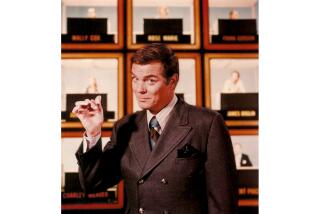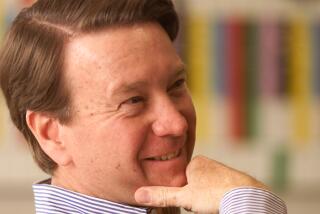Elton Rule, Ex-Chief of ABC, Dies
- Share via
Elton H. Rule, who graduated from the ranks of local television in Los Angeles to lead ABC’s transformation from industry laughingstock to the dominant network in the 1970s, died Saturday. He was 72.
Rule, who was president and chief operating officer of American Broadcasting Cos. Inc. from 1972 until 1983, died of cancer at his Beverly Hills home.
When he took over the struggling network, it had fewer stations, fewer hit shows and fewer viewers than its older competitors NBC and CBS.
ABC, the joke went, was fourth among the three commercial networks.
But during Rule’s tenure, ABC accomplished a remarkable ascension, passing NBC in the race for viewers to challenge perennial leader CBS, and building a management structure regarded as the most solid in the industry.
“There is no parallel in the history of broadcasting,” Time magazine stated in 1977, the year ABC surged to the top. “It’s as if in the space of two years, Chrysler had surged past General Motors and sent Ford reeling back to Dearborn. Or as if China had discovered some mysterious ‘Z’ bomb and in victorious glee ordered both the White House and the Kremlin dismantled and shipped to Peking.”
Rule, who had demanded and received more autonomy to run the network than any other television president, was cool even in victory, telling a Times interviewer as he walked along the beach at his vacation home in Trancas: “I was surprised at the degree of success, but we were always headed this way, we were always in the game.”
Elton Hoerl Rule grew up with broadcasting.
Born in Stockton on June 13, 1917, he attended Sacramento College, then gravitated to a local “100-watt station,” KROY, in 1938.
He later described that job as “announcer dash writer dash salesman dash producer dash director dash. . . . On those stations, you did everything. You went out and sold ads, came back and wrote the copy, put a show together--news, interviews, music--and did the announcing.”
After infantry service in the Pacific during World War II, during which he achieved the rank of major and earned a purple heart, Rule moved to Los Angeles to sell advertising for KLAC.
“KLAC had a television station, Channel 13, but nobody paid any attention to it,” Rule said. “I became one of the first salesmen to try and sell TV time.”
Actress Betty White once recalled that it was a touch-and-go operation, requiring her to stand on one foot filling air time, nervously waiting for Rule to rush in with a client so that she could tout the client’s refrigerator or other product on the air.
Rule next moved to Los Angeles’ KECA-TV, which became KABC, and he had his toehold on the ABC empire. He became station manager in 1960, and kept his station at the top of the Los Angeles market when NBC and CBS networks dominated television nationally.
In 1968, after ABC’s merger negotiations with the ITT conglomerate fell, the entertainment company’s chairman, Leonard Goldenson, called Rule to lead his television operation out of its doldrums.
“Either I make it and turn the network around or I go home to California,” Rule told The Times’ television critic Cecil Smith as he set off for New York.
He made it, and he didn’t come home to California for 15 years.
The climb was rapid. In 1968, Rule was named president of ABC Television. In 1969, he became a group vice president of ABC Inc. In 1970, he was named to its board of directors and, in 1972, he became president and chief operating officer of the entire company.
Rule and his coterie of wizards, including Hollywood producer Aaron Spelling, Roone Arledge, Fred Silverman and Martin Starger, boosted ABC out of the ratings cellar with popular if frivolous series like “Starsky & Hutch,” “Love Boat,” “Charlie’s Angels,” and “Happy Days” and sports events including “Monday Night Football” and the Olympics.
But Rule also presented miniseries, specials and made-for-TV movies of a superior quality unseen before on television that proved remarkably popular with viewers: “Roots,” “Eleanor and Franklin,” “Merchant of Venice,” “Long Day’s Journey into Night,” and “Duel.”
He had brought the network a long way from the days when analysts said ABC would never be successful because there wasn’t enough business for three networks, and when jokes were rampant: “Put the Vietnam War on ABC and it’ll be over in 13 weeks,” or “They found Patty Hearst; she was hiding on ABC on Friday night.”
The network began turning a profit in 1972, and by 1977 collected more money for advertising time than the other two networks. In Rule’s time, 1968 to 1983, the television network grew from 146 affiliated stations to 214, and the radio network increased from 365 stations to 1,809.
While Rule shared credit for the turnaround to those who surrounded him, most industry analysts said he was primarily responsible for the dramatic shift in fortunes.
When Rule retired in 1983, turning the reins over to his hand-picked successor, Frederick S. Pierce, he became vice chairman of the company, second to Goldenson.
Rule retired from that position in January, 1984, and left ABC’s board of directors the following September.
As a “retiree,” Rule had founded two production companies.
Among his awards were the Gold Medal Award of the International Radio and Television Society in 1975, the Governor’s Award of the Academy of Television Arts and Sciences in 1981, and the Distinguished Service Award of the National Assn. of Broadcasters in 1984.
Rule is survived by his wife, the former Betty Louise Bender whom he married in 1942, and three children, Cindy Dunne, Christie and James Rule, all of Los Angeles, and two grandchildren.
More to Read
The biggest entertainment stories
Get our big stories about Hollywood, film, television, music, arts, culture and more right in your inbox as soon as they publish.
You may occasionally receive promotional content from the Los Angeles Times.










